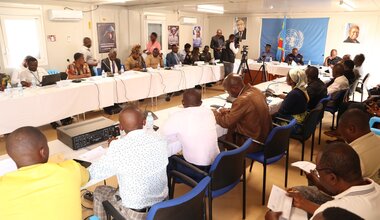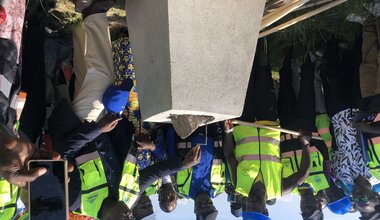Security Council Resolution 1325 on women, peace and security: 10th Anniversary and new commitments
Kinshasa, 2 November 2010 - On the 10th anniversary of the adoption of Security Council Resolution 1325, the UN system in partnership with the Ministry of Gender, Family and Children organized a Day of advocacy and sensitization for mobilization of funds in favor of the National Action Plan under the guidelines of Resolution 1325 in Kinshasa on October 30, 2010.
It may be recalled that the Resolution 1325 is the first United Nations resolution which attached great importance to the condition of women with the conditions of peace and security and called for the due and equal role of women in efforts aiming to maintain and promote peace and security. This day was an opportunity for all to re commit themselves to the full implemetation of the Resolution's objectives.
The Act of Engagement signed by the national authorities and the international community on the occasion is supposed to mobilize all stakeholders so that National Action Plan under 1325 is fully applied with the provision of requisite financial resources for achievement of targets in the fields of: peace, security, HIV/AIDS, sexual violence, women rights, political involvement, right of state funding, regional and international cooperation, research and study, follow-up and assessment. The National Action Plan under the Resolution 1325 is an initiative of the Ministry of Gender, Family and Children hand in hand with the MONUSCO gender office which are engaged in translating the objectives set forth in Security Council Resolution 1325 to concrete actions for the DRC.
The ceremony which was organized by the UN gender team had Ms. Marie-Ange Lukiana Mufwankolo, Minister of Gender, Family and Children and Mr. Abdou Dieng, WFP representative who also represented the SRSG, Mr. Roger A Meece. Also spoke on the occasion among others representing various diplomatic missions were Mr. Flavio R. Bonzanini, Brazilian ambassador and Ms. Mette Sunnergren, representative of Swedish Agency of Cooperation. The ceremony was attended by a number of national authorities and representatives, women groups' representatives, UN staff members and other youth groups.
The SRSG Roger A Meece in his message read out by Mr. Abdou Dieng said that the mobilization of funds for the National Action Plan under Resolution 1325 was crucial for the development of DRC as fair sex accounted for 52% of the population and 60% of the workforce of the country. He said that the opportunity provided him a chance to reflect on the pain and agony Congolese underwent during more than a decade of protracted conflict. He said that the day also warranted for concrete work under Resolution 1325 in terms of domestic, regional and international spheres, adding that Resolution 1325 is a unique document as no other document has aroused so much international debate in terms of peacekeeping operations. The Resolution 1325 exclusively deals with women in the situation of armed conflict and focuses on the rights, protection, representation and involvement in workforce and government, equality of men and women, respect and dignity of women and girls, etc. during various stages of peacekeeping operations. In his message, SRSG Roger Meece while calling for generous financial, logistical and technical assistance from all national and international donors to this Action Plan also mentioned that DRC was among the twenty four countries which had initiated National Action Plan under Resolution 1325 on UN Secretary General's demand.
The Minister for Gender, Family and Children, Marie-Ange Lukiana Mufwankol who is also president of the Pilot Committee for realizing the objectives set forth in the Resolution 1325 said, " the day of 10th anniversary of the Resolution was to say 'No' to arms, war, crime, violence, etc. and to say, 'Yes' to durable peace." She said, "the Resolution 1325 takes into account ground realities. The capacity of women needs to be reinforced. Improved security conditions are a prerequisite for women including others to contribute to the development. Women should play their due role, by having increased participation in representation and by involving themselves in decision making. She said the historic World Women March at Bukavu was expression of a big 'No' to militarization, sexual violence, injustice, impunity, inequality and oppression. While having all prerequisite laws, regulations and plans; referring to STAREC (stabilization and reconstruction plan) and the 'will', we are confident that things will change in favour of women and we will see good results." She thanked MONUSCO gender unit and the UN team for arranging the event which opened the door to all to contribute. She also praised the impressive songs pertaining to women emancipation by youth groups.
Among several diplomatic missions' representatives present at the ceremony, notably Swedish and Brazilian diplomats in their brief statements spoke about their governments' contribution plans to the DRC National Action Plan under Resolution 1325. At the end, the Act of Engagement was signed by all including representatives of the UN, government, diplomatic missions and others present on the occasion. The fund raising day was a success could be gauged by the fact that several donors have promised for an amount of US$ 4.0 millIion so far, for implementation of the National Action Plan.
 UN
UN United Nations Peacekeeping
United Nations Peacekeeping






